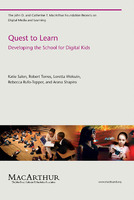Quest to Learn
Developing the School for Digital Kids
| dc.contributor.author | Salen Tekinbaş, Katie | |
| dc.contributor.author | Torres, Robert | |
| dc.contributor.author | Wolozin, Loretta | |
| dc.contributor.author | Rufo-Tepper, Rebecca | |
| dc.contributor.author | Shapiro, Arana | |
| dc.date.accessioned | 2019-01-21 11:53:52 | |
| dc.date.accessioned | 2020-04-01T10:58:38Z | |
| dc.date.available | 2020-04-01T10:58:38Z | |
| dc.date.issued | 2010 | |
| dc.identifier | 1004017 | |
| dc.identifier | OCN: 1100490104 | en_US |
| dc.identifier.uri | http://library.oapen.org/handle/20.500.12657/26068 | |
| dc.description.abstract | The design for Quest to Learn, an innovative school in New York City that offers a “game-like” approach to learning. Quest to Learn, an innovative school for grades 6 to 12 in New York City, grew out of the idea that gaming and game design offer a promising new paradigm for curriculum and learning. The designers of Quest to Learn developed an approach to learning that draws from what games do best: drop kids into inquiry-based, complex problem spaces that are built to help players understand how they are doing, what they need to work on, and where to go next. Content is not treated as dry information but as a living resource; students are encouraged to interact with the larger world in ways that feel relevant, exciting, and empowering. Quest to Learn opened in the fall of 2009 with 76 sixth graders. In their first semester, these students learned—among other things—to convert fractions into decimals in order to break a piece of code found in a library book; to use atlases and read maps to create a location guide for a reality television series; and to create video tutorials for a hapless group of fictional inventors. This research and development document outlines the learning framework for the school, making the original design available to others in the field. Elements in development include a detailed curriculum map, a budget, and samples of student and teacher handbooks. | |
| dc.language | English | |
| dc.subject.classification | thema EDItEUR::G Reference, Information and Interdisciplinary subjects::GT Interdisciplinary studies::GTV Institutions and learned societies: general | en_US |
| dc.subject.classification | thema EDItEUR::J Society and Social Sciences::JN Education::JNF Educational strategies and policy | en_US |
| dc.subject.classification | thema EDItEUR::U Computing and Information Technology::UD Digital Lifestyle and online world: consumer and user guides::UDX Computer games / online games: strategy guides | en_US |
| dc.subject.other | innovation | |
| dc.subject.other | education innovation | |
| dc.subject.other | hands on learning | |
| dc.subject.other | educational games | |
| dc.subject.other | learning games | |
| dc.subject.other | primary education | |
| dc.subject.other | primary school | |
| dc.subject.other | secondary education | |
| dc.subject.other | secondary school | |
| dc.subject.other | middle school | |
| dc.subject.other | high school | |
| dc.subject.other | alternative schooling | |
| dc.subject.other | game-based learning | |
| dc.subject.other | game-based teaching | |
| dc.subject.other | alternative education | |
| dc.subject.other | public schools | |
| dc.subject.other | New York schools | |
| dc.subject.other | New York City schools | |
| dc.subject.other | NYC schools | |
| dc.subject.other | Q2L | |
| dc.subject.other | curriculum map | |
| dc.subject.other | budget | |
| dc.subject.other | creative schools | |
| dc.subject.other | games and learning | |
| dc.title | Quest to Learn | |
| dc.title.alternative | Developing the School for Digital Kids | |
| dc.type | book | |
| oapen.relation.isPublishedBy | f49dea23-efb1-407d-8ac0-6ed2b5cb4b74 | |
| oapen.relation.isbn | 9780262515658 | |
| oapen.pages | 164 | |
| oapen.place.publication | Cambridge | |
| oapen.remark.public | 21-7-2020 - No DOI registered in CrossRef for ISBN 9780262294171 | |
| oapen.identifier.ocn | 1100490104 |

